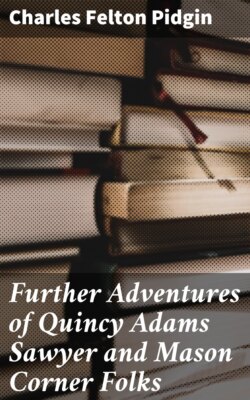Читать книгу Further Adventures of Quincy Adams Sawyer and Mason Corner Folks - Charles Felton Pidgin - Страница 13
На сайте Литреса книга снята с продажи.
“QUINCY.”
ОглавлениеTable of Contents
As they were leaving the office Quincy met Tobias Smith, father of Abbott and Ellis Smith, and Wallace Stackpole.
“Glad to see you, Guv'nor,” said 'Bias. “You remember Mr. Stackpole that we gave Strout's job of tax-collector to—he's held it ever since. We're mighty glad Strout lives in Fernborough. We don't have circuses at town meetings now he's gone.”
Quincy's next visit was to the office of the Fernborough Gazette, which was published in Eastborough, as the editor and proprietor, Mr. Sylvester Chisholm, Mr. Strout's brother-in-law, could not get printers in Fernborough, and, being an Eastborough-born boy, his paper had a large circulation in that town and in Westvale, its principal village.
Quincy obtained some copies of the paper containing his speech at the Town Hall. On looking it over he was astonished to find it reported verbatim.
“How did you manage it, Mr. Chisholm? My address was extemporaneous.”
Sylvester smiled. “Well, the fact is, Mr. Sawyer, while I was working on the Eastborough Express, when you were here five years ago, I studied short-hand, and it came in handy that night.”
The train was express to Boston and Quincy was in his chair in the Executive Chamber by half-past eleven. After a careful examination of the case of Ivan Wolaski, he decided to refuse the request for extradition, and the Governor of Colorado was so notified in a communication which from moral, legal, political, and humanitarian points of view was unanswerable. It was nearly two o'clock when the last official letter was signed.
The door was opened by the messenger. Quincy expected Maude to enter, but it was Mr. Acton, the energetic opponent of the “peaceful picketing” law.
“I heard, Mr. Governor, that you were here, and I thought it only fair to inform you that we shall apply for injunctions just the same as if that bill you signed had not become a law, and, in that way, test its constitutionality.”
“You have a legal right to do that,” said the governor, “but I question your moral right.”
“How so?” asked Mr. Acton.
“Supposing I had applied for an injunction to prevent you and a score of others from trying to influence me to veto the bill?”
“That would have been foolish. No judge would have granted it.”
“And why not?” said the governor sternly. “Were not all of you engaged in 'peaceful picketing'? Why should not the working man have the same right to persuade his fellows that you exerted to influence me?”
Mr. Acton had not exhausted his argument: “But the probable destruction of property and possible loss of life?”
“Matters fully covered by law,” the Governor replied. “They are under the jurisdiction of the police, the sheriff, and, if need be, the militia.”
Mr. Acton, despite the argument advanced, “was of the same opinion still.”
Quincy rang for the messenger, who appeared.
“I am going now. Does any one wish to see me?”
“There's a young lady outside. She's been waiting some time.”
Quincy looked at his watch. It was quarter past two.
“Admit her, at once.”
Maude began the conversation. “I received your astonishing telegram, Quincy, and was here on time,” and she emphasized the final words.
“What does it mean? Is Alice sick?”
Quincy took the cue. “Not exactly sick, but she wants to see you very much, and I felt so sure you would come to please her, that I ignored your refusal to accept an invitation from me. Come, we'll have lunch at Young's, and then a carriage to the station—is your trunk there?”
Maude nodded. She felt that Quincy had played a trick on her and she was in a rebellious mood.
She ate her lunch in silence. Not a word was spoken during the drive to the station. When the train was under way Quincy remarked, casually, “I invited Mr. Merry to come down next Saturday and stay over Sunday.”
From that moment until they reached Eastborough Centre, Quincy could not have desired a more talkative or vivacious companion. As they stepped upon the platform, Mr. Parsons came up.
“They're there, safe and sound. I went up with them myself, so's to be sure.”
